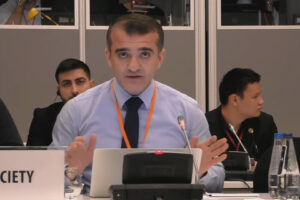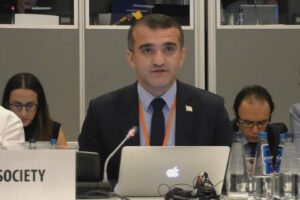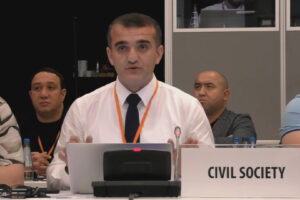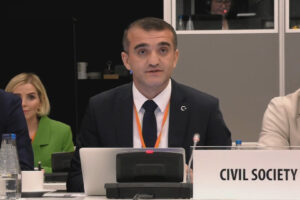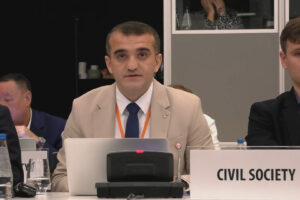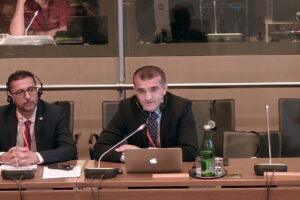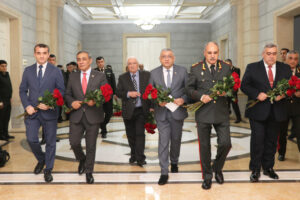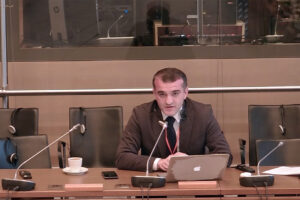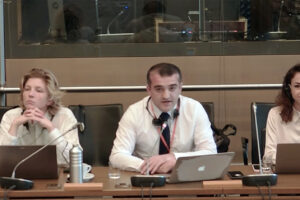Freedom House: Azerbaijan – the situation is hopeless

The human rights organization Freedom House has published a progress report on the situation of freedom in the world.
In the section devoted to Azerbaijan, it is said that the country is ruled by an authoritarian regime, characterized by intolerance of dissent and disregard for civil liberties and political rights.
With the advent of Ilham Aliyev in 2003 increased repressive measures, and large inflow of oil revenue was used to enhance the security of the regime and the suppression of internal and external criticism.
In October 2013, Ilham Aliyev became president for the third time in a “deeply flawed elections.” His victory was expected because of the monopoly over state resources and ruthless tactics of intimidation.
Authorities are still struggling with public protests, introduced heavy fines for participating and organizing unsanctioned protests. New amendments to the legislation in March, made it extremely difficult work of NGOs,
In recent years the regime has been steadily consolidating its control over the activities of civil society through various legal and non-judicial means.
On the eve of the presidential election, state authorities have taken new steps to silence independent media. The government expanded the scope of the provisions on defamation on the Internet, punishing offensive remarks to three years’ imprisonment.
Authorities used trumped-up charges to silence critical journalists, while violence and attacks on journalists have remained uninvestigated.
The economic situation of the independent media remains fragile; by year’s end, two opposition newspapers Azadliq and Yeni Musavat, were in danger of closing because of the exorbitant fines.
Local authorities are subordinate to the executive and financial dependence on the central government. Regions of the country as separate fiefdoms provided oligarchs and state officials.
In January, a minor car accident in Ismailly caused riots due to economic inequality, corruption, and arbitrary distribution of the local executive.
Executive power is regularly uses the judiciary and security forces to suppress threats to the regime. Several activists, bloggers and politicians have been harassed or arrested during the year, including the presidential candidate Ilgar Mamedov and the head of the local observer mission Anar Mammadli.
Journalists, activists and opposition figures have been accused of more serious crimes than in the previous year.
State control over oil resources and the oligarchic structure of the economy contributes to the widespread corruption in Azerbaijan, as well as the existence of the bureaucracy of the Soviet style.
In 2013, the Azerbaijani government tried to deal with low and medium levels of corruption by improving access to official documents, such as passports or birth certificates.
Nevertheless, high-level corruption remained completely unnoticed, Aliyev family, government officials and their relatives continued to accumulate considerable personal fortune. An example of such corruption has a video of the sale of the seats with the deputy Gular Akhmedova which convicted of fraud.
The government has no motivation to carry out serious political reforms. After the election, the Aliyev regime continues to consolidate his power. With oil production is likely to increase economic and social inequality. In addition, the rise in prices of petroleum products at the end of 2013 will lead to an increase in basic commodity prices. This economic frustration will lead to increased social tension that pushes the regime to strengthen the repressive apparatus.
Constitution and legislative framework of Azerbaijan guarantees freedom of expression as a fundamental right. In the past two decades, however, the government regularly used violence, intimidation and criminal laws to stifle public debate and to silence dissent.
In addition to political pressure, critical journalists continue to face threats, blackmail and physical assault. According to the Media Rights Institute, there were 47 cases of attacks on journalists in the first half of 2013.
There is still no progress in the investigation of the murder of two journalists, Elmar Huseynov, who was killed in 2005, and Rafiq Tagi, killed in 2011; as well as in case of the death in prison of Novruzali Mamedov. Investigation of complaints from the journalist Khadija Ismailova became the target of a smear campaign, not moving since 2012.
Access to information is limited and journalists are facing difficulties when requesting data from government agencies, which are often reluctant to give information to the opposition and independent media and repeatedly denied them accreditation for important national and official events.
Freedom House: Azerbaijan – the situation is hopeless
 12 June 2014
12 June 2014
The human rights organization Freedom House has published a progress report on the situation of freedom in the world.
In the section devoted to Azerbaijan, it is said that the country is ruled by an authoritarian regime, characterized by intolerance of dissent and disregard for civil liberties and political rights.
With the advent of Ilham Aliyev in 2003 increased repressive measures, and large inflow of oil revenue was used to enhance the security of the regime and the suppression of internal and external criticism.
In October 2013, Ilham Aliyev became president for the third time in a “deeply flawed elections.” His victory was expected because of the monopoly over state resources and ruthless tactics of intimidation.
Authorities are still struggling with public protests, introduced heavy fines for participating and organizing unsanctioned protests. New amendments to the legislation in March, made it extremely difficult work of NGOs,
In recent years the regime has been steadily consolidating its control over the activities of civil society through various legal and non-judicial means.
On the eve of the presidential election, state authorities have taken new steps to silence independent media. The government expanded the scope of the provisions on defamation on the Internet, punishing offensive remarks to three years’ imprisonment.
Authorities used trumped-up charges to silence critical journalists, while violence and attacks on journalists have remained uninvestigated.
The economic situation of the independent media remains fragile; by year’s end, two opposition newspapers Azadliq and Yeni Musavat, were in danger of closing because of the exorbitant fines.
Local authorities are subordinate to the executive and financial dependence on the central government. Regions of the country as separate fiefdoms provided oligarchs and state officials.
In January, a minor car accident in Ismailly caused riots due to economic inequality, corruption, and arbitrary distribution of the local executive.
Executive power is regularly uses the judiciary and security forces to suppress threats to the regime. Several activists, bloggers and politicians have been harassed or arrested during the year, including the presidential candidate Ilgar Mamedov and the head of the local observer mission Anar Mammadli.
Journalists, activists and opposition figures have been accused of more serious crimes than in the previous year.
State control over oil resources and the oligarchic structure of the economy contributes to the widespread corruption in Azerbaijan, as well as the existence of the bureaucracy of the Soviet style.
In 2013, the Azerbaijani government tried to deal with low and medium levels of corruption by improving access to official documents, such as passports or birth certificates.
Nevertheless, high-level corruption remained completely unnoticed, Aliyev family, government officials and their relatives continued to accumulate considerable personal fortune. An example of such corruption has a video of the sale of the seats with the deputy Gular Akhmedova which convicted of fraud.
The government has no motivation to carry out serious political reforms. After the election, the Aliyev regime continues to consolidate his power. With oil production is likely to increase economic and social inequality. In addition, the rise in prices of petroleum products at the end of 2013 will lead to an increase in basic commodity prices. This economic frustration will lead to increased social tension that pushes the regime to strengthen the repressive apparatus.
Constitution and legislative framework of Azerbaijan guarantees freedom of expression as a fundamental right. In the past two decades, however, the government regularly used violence, intimidation and criminal laws to stifle public debate and to silence dissent.
In addition to political pressure, critical journalists continue to face threats, blackmail and physical assault. According to the Media Rights Institute, there were 47 cases of attacks on journalists in the first half of 2013.
There is still no progress in the investigation of the murder of two journalists, Elmar Huseynov, who was killed in 2005, and Rafiq Tagi, killed in 2011; as well as in case of the death in prison of Novruzali Mamedov. Investigation of complaints from the journalist Khadija Ismailova became the target of a smear campaign, not moving since 2012.
Access to information is limited and journalists are facing difficulties when requesting data from government agencies, which are often reluctant to give information to the opposition and independent media and repeatedly denied them accreditation for important national and official events.
 @
@











